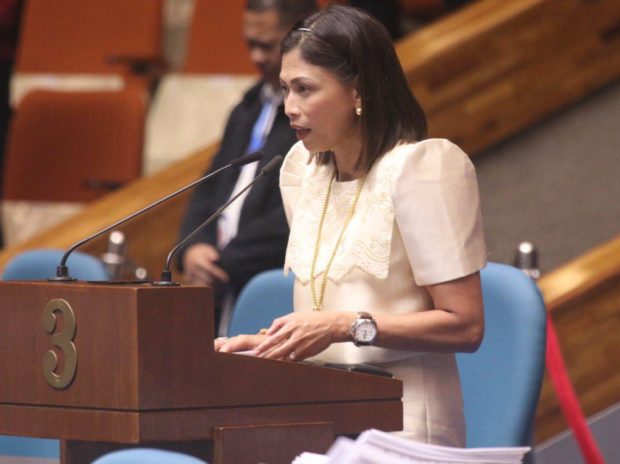
Marikina City 2nd Dist. Rep. Stella Luz Quimbo. (Photo from her Facebook account)
MANILA, Philippines — Marikina City Rep. Stella Luz Quimbo is pushing for the passage of a third Bayanihan Law that will allocate at least P340 billion to help cushion the economic impact of the coronavirus pandemic on the country.
The P4.506 trillion 2021 national budget was based on the assumption that the economy will only contract at 5.5 percent this year, she explained in a privilege speech on Monday during the first session of the House after a one-month break.
But a more realistic forecast, she pointed out, would be an 8 to 10 percent decline in the gross domestic product as projected by various international groups.
“The 2021 national budget – being a COVID budget, includes COVID related spending that is presumed to sufficiently address an expected 5.5 percent contraction of the economy,” Quimbo, who’s an economist, said.
“And since the contraction is likely to be deeper than expected, the proposed COVID response in its current shape in the 2021 GAB, is simply insufficient. Kulang na kulang po ang COVID response natin,” she added.
Thus, she urged legislators in both the House and the Senate, as well as the executive department, to enact a Bayanihan 3 to help Filipinos affected by the economic decline.
She compared the duration of the pandemic to a telenovela that needed a third part in aid.
“Bayanihan pa more. Ang kelangan — if we are to recover from the impact of this pandemic sooner rather than later — is another stimulus package: Bayanihan Part 3,” Quimbo said.
Quimbo’s proposal
One of the focuses of Quimbo’s proposed Bayanihan 3 is the provision of social amelioration for poor Filipinos to ensure that they can cover their basic needs.
“We also need additional unemployment assistance through DOLE (Department of Labor and Employment), as so many workers continue to be out of work, and many more are still at risk until we get a handle of the COVID situation,” Quimbo said.
Further, Quimbo also pushed for helping businesses, which in turn, can also restore jobs.
This includes the provision of worker subsidies to pay for testing and sick leaves for workers with COVID-19 and overtime pay to enable staggered work hours and multiple shifts.
“Bayanihan 3 must also provide sufficient funds for retooling, reskilling, and other capacity-building programs for our critically impacted businesses, as well as internet allowances to teachers and students,” Quimbo said.
“These funds will go a long way towards ensuring that businesses and schools are able to adapt to the challenges of COVID and continue to operate effectively,” she added.
But the “most crucial required intervention” in the measure for Quimbo is the adequate funding for COVID-19 vaccines as there was the possibility of countries rushing to be first in line to suppliers.
“Hence, Bayanihan 3 should also authorize the executive to enter into advance purchase agreements with vaccine suppliers,” she said. “We should all be reminded that the vaccine is the only way that we can return to our original trajectory of growth. We must prepare well for the advent of the vaccine.”
Bayanihan 3 must also help ensure that the government will prioritize funding projects that are implementation-ready and that highly impact economic growth, specifically, infrastructure, said Quimbo.
In wrapping up her speech, Quimbo said a joint executive and legislative council should be created to ensure that the Bayanihan 3 would be implemented properly.
The lawmaker added that Bayanihan 3 should institutionalize a long-term plan for economic resilience, which would be formulated by the National Economic and Development Authority.
[atm]